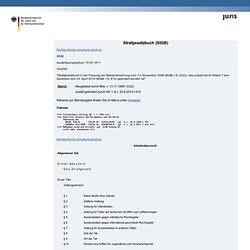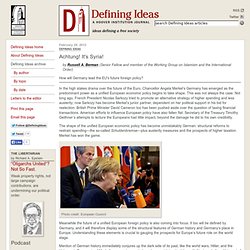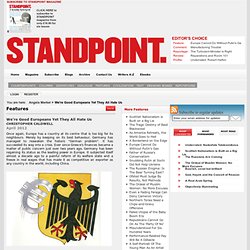

Germany's 'failed' multiculturalism carries on regardless. One in five people living in Germany now comes from an immigrant background, according to figures released on Thursday. They show that the minority community grew by more than 1.3% last year at a time when the overall population is falling. StGB - Strafgesetzbuch. (1) Wer eine Vereinigung gründet, deren Zwecke oder deren Tätigkeit darauf gerichtet sind, Mord (§ 211) oder Totschlag (§ 212) oder Völkermord (§ 6 des Völkerstrafgesetzbuches) oder Verbrechen gegen die Menschlichkeit (§ 7 des Völkerstrafgesetzbuches) oder Kriegsverbrechen (§§ 8, 9, 10, 11 oder § 12 des Völkerstrafgesetzbuches) oder Straftaten gegen die persönliche Freiheit in den Fällen des § 239a oder des § 239b (weggefallen) zu begehen, oder wer sich an einer solchen Vereinigung als Mitglied beteiligt, wird mit Freiheitsstrafe von einem Jahr bis zu zehn Jahren bestraft.

Achtung! It's Syria! How will Germany lead the EU's future foreign policy?

In the high stakes drama over the future of the Euro, Chancellor Angela Merkel’s Germany has emerged as the predominant power as a unified European economic policy begins to take shape. This was not always the case. Not long ago, French President Nicolas Sarkozy tried to promote an alternative strategy of higher spending and less austerity; now Sarkozy has become Merkel’s junior partner, dependent on her political support in his bid for reelection. British Prime Minister David Cameron too has been pushed aside over the question of taxing financial transactions.
American efforts to influence European policy have also fallen flat: Secretary of the Treasury Timothy Geithner’s attempts to lecture the Europeans had little impact, beyond the damage he did to his own credibility. Photo credit: European Council Meanwhile the future of a unified European foreign policy is also coming into focus. Russell A. Unfiltered Democracy: Why Germany Should Get Rid of the Presidency - SPIEGEL ONLINE - News - International.
Is the republic at the edge of the abyss?

Are the pillars of democracy swaying? For the last four weeks, Germany has debated the loan scandal surrounding its president, and for just as long, we have heard warnings that the discussion of the tiresome loan could "damage" his office. Sigmar Gabriel, chairman of the center-left Social Democratic Party (SPD), even went as far as saying that German President Christian Wulff could not resign because it might trigger a "national crisis.
" "Germany and the rhinoceros" by Hans Kundnani. We're Good Europeans Yet They All Hate Us. Once again, Europe has a country at its centre that is too big for its neighbours.

Merely by keeping on its best behaviour, Germany has managed to reawaken the historic "German problem". It has succeeded its way into a crisis. Ever since Greece's finances became a matter of public concern just over two years ago, Germany has been regaining its status as the leading power in Europe. It subjected itself almost a decade ago to a painful reform of its welfare state and a freeze in real wages that has made it as competitive an exporter as any country in the world, including China.
Now Germany's economy is better balanced than those of other European countries, its reputation for honest accounting stands higher, and it has kept its triple-A credit rating while France, Austria and others have been downgraded. Nearly everyone agrees that Germany must save the Mediterranean economies. But a brewing populist opposition believes otherwise. The Merkelization of Europe - By Paul Hockenos. Not so long ago, France was the political driver and Germany the economic motor of the European Union.

"Now," remarked former European Commission president Romani Prodi in February, it is Merkel "that decides and Sarkozy that holds a press conference to explain her decisions. " Angela Merkel and the Euro Crisis: Women in Leadership. German Dominance in Doubt after Summit Defeat. It was Monti, of all people, "Super Mario," as he's called in Berlin.

The affable economics professor from Lombardy, the man the German Chancellery felt was the best thing that could have happened to Italy. The man who could "save Europe," at least according to Time magazine. It was Monti, of all people, who dropped the bomb at 7 p.m. last Thursday. Can Germany Help Central Europe Confront Its Dark Past? - The Chronicle Review. By Paul Hockenos The home of the German Historical Institute in downtown Warsaw is a handsome, 19th-century neo-Renaissance residence with arched doorways and a tranquil, cobbled courtyard.

It is one of the few structures in Warsaw that the Nazis didn't raze during their 1939-45 occupation of the Polish capital. "Ironic, isn't it? ," says Katrin Stoll, a young German researcher there. "A building the Germans didn't manage to destroy and now we're here. " Supported by Germany's ministry of science and education, the institute was established in 1993 to promote collaborative research, scholarly discourse, and exchanges between Germany and Poland, with a particular emphasis on the dictatorships and violence of the 20th century. Eduard Mühle, a German historian and the institute's director, takes pains to explain the institute's purpose. "We are modest participants in Polish historiography," he says.
Concerns about Central Europe's memory politics are not without basis. Hatred transformed: How Germans changed their minds about Jews, 1890-2006. How and when do people change their minds?

For example, watching a popular television series like AMC’s Mad Men seems to transport us straight to another planet. It shows the lives of advertising executives on Madison Avenue in the 1960s who spend their days drinking heavily (from 9am), chain-smoking, and fornicating. While not necessarily an accurate portrayal of corporate life in the middle of the 20th century, it reminds us how deeply cultures can be transformed in a relatively short space of time.
In the Western world today, attitudes towards homosexuals, pre-marital sex, and women working outside the home are radically different from what they were a generation ago (Fernandez-Villaverde et al. 2011). Pretzel swastikas and Döner killings: are Germany’s best intentions becoming its fatal flaw? Germany. Germany Looks to Southern Europe to Fill Jobs. "No Peter’s Pence" by Alexander Görlach. Exit from comment view mode.

Click to hide this space.